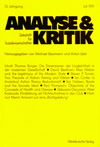Suchergebnisse
"Reiner Eichenberger"
Titel: Bessere Politik dank Deregulierung des politischen Prozesses
Autor: Reiner Eichenberger
Seite: 43-60
Abstract: Today, political competition and, thus, the politicians, incentives to cater for the citizens, preferences are weakened by protectionist regulations aiming at the politicians, origin, their incomes, and the "production process of politics". This paper proposes to abolish these regulations and to institutionalize an open, international market for politics. Foreign as well as profit-seeking "policy producers" should be allowed to run directly for office without nominating specific individuals. This enables a policy supplier to become active in several countries and jurisdictions and, thus, to build up an international reputation for being credible, i.e. of sticking to his promises and not exploiting the voters after election. The deregulation program strengthens the influence of the weakly organized social groups and the governments, incentives to pursue what is of general interest.
Titel: Deregulierung ist kein Allheilmittel! Oder: Was gut für die Wirtschaft ist, muss nicht gut für die Politik sein
Autor: Stefan Marschall
Seite: 61-68
Abstract: This paper responds to the reform agenda of Reiner Eichenberger who proposes the deregulation of the voting system in order to enhance the competition among the candidates and to improve the responsiveness of elected representatives. Based on the theory of parliamentary representation the paper argues that a simple transfer of economic principles into the realm of politics comes to its limits where the differences between the economic and political systems are significant. Regulation in politics is necessary and unavoidable where the abuse of political power is to be prevented.
Titel: Ein politisch-ökonomischer Blick auf Diskurse. Kooperativ beim Aperitif - mit Interessen zum Essen
Autor: Reiner Eichenberger
Seite: 225-244
Abstract: Cooperative discourse procedures produce consensual siting proposals for NIMBY-projects-but only if these proposals do not affect the final siting decision. Then, the members of the discourse commissions stay independent and face few incentives to pursue consequentialist interests. However, the more influential discourse procedures become, the stronger the interest groups, incentives are to take advantage of them. Thus, cooperative discourses turn into competitive, interest-centred procedures whose outcome is rejected by the less influential groups. The evolution, of discourse procedures into functionally specialized parliaments or even into FOCJ (Functional, Overlapping, Competing Jurisdictions) seems worth pursuing.

Entscheidung durch Diskurs
1996 (18) Heft 2
Editorial
In jeder Gesellschaft müssen kollektive Entscheidungen gefällt werden, die nicht für alle Betroffenen in gleichem Maße Vorteile bringen und die Lasten auf sie nicht in gleicher Weise verteilen. Exemplarisch hierfür stehen Entscheidungen im Umweltbereich, bei denen etwa über den Standort einer Abfalldeponie befunden werden muß. Gemäß dem Ideal der Demokratie sollten es die Bürger selbst sein, die solche Entscheidungen fällen. Die Umsetzung dieses Ideals in die Praxis ist aber selten vo...